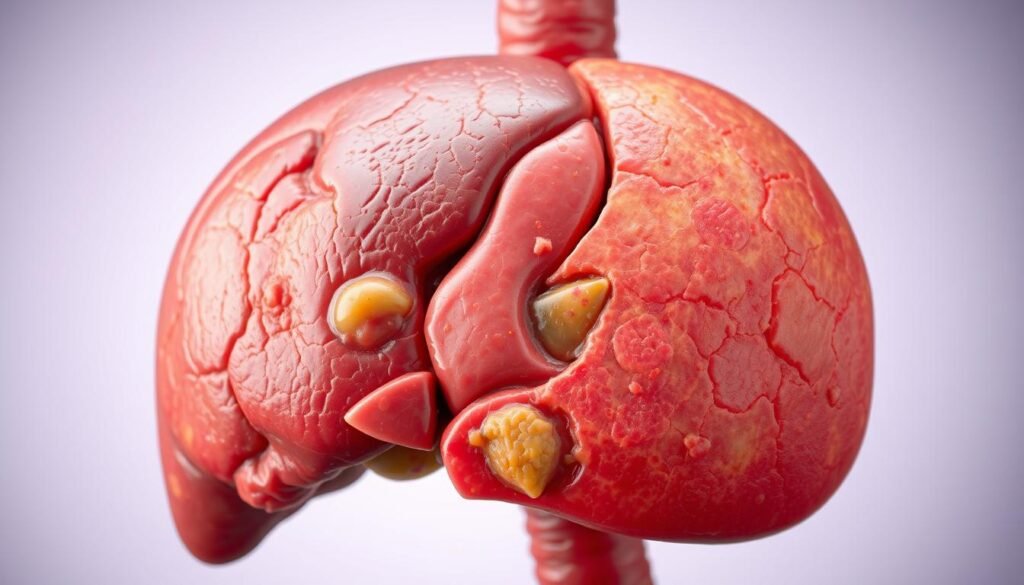Liver cirrhosis was always seen as final, but now there’s hope. Studies show it might be reversible. This is big news for people with this illness. Let’s dive into the possibility of reversing cirrhosis, what affects its reversal, and new ways to keep your liver healthy.
Key Takeaways
- Cirrhosis was once deemed irreversible, but studies suggest the potential for liver fibrosis reversibility.
- Chronic inflammation is a critical factor in the development of hepatic fibrosis.
- Lifestyle changes, including a plant-based diet and regular physical activity, can significantly improve liver health.
- Early diagnosis is essential to prevent the progression of liver diseases to cirrhosis.
- Activated hepatic stellate cells play a significant role in fibrosis development and progression.
- Dietary supplements may contribute positively towards maintaining liver function.
Understanding Cirrhosis: Causes and Symptoms
Cirrhosis is a major health issue where healthy liver tissue turns into scar tissue. This change happens slowly because of ongoing liver injuries. It makes the liver work worse over time. The causes of cirrhosis include heavy alcohol use, chronic hepatitis B and C, and non-alcoholic fatty liver disease (NAFLD). Autoimmune diseases and bile duct problems also play a role.
At first, the symptoms of cirrhosis might be hard to spot. People might feel tired, sick to their stomach, and not hungry. These early signs are easy to confuse with other illnesses. As the disease gets worse, the symptoms become more serious. People may turn yellow, feel pain in the belly, swell up in the legs or belly, and have trouble thinking clearly.
Knowing the symptoms of cirrhosis is key to getting help early. If not treated, it can lead to liver cancer and other serious problems. It’s important for people at risk to recognize these signs and see a doctor right away. While cirrhosis can’t be cured, treatments can stop more damage and help with symptoms. To learn more about cirrhosis, check out this resource.
| Causes of Cirrhosis | Symptoms of Cirrhosis |
|---|---|
| Alcohol abuse | Fatigue |
| Chronic viral hepatitis (B and C) | Nausea |
| Non-alcoholic fatty liver disease (NAFLD) | Loss of appetite |
| Autoimmune liver diseases | Jaundice (yellowing of skin and eyes) |
| Bile duct obstruction | Abdominal pain |
| Metabolic disorders (e.g., Wilson’s disease) | Fluid retention (ascites) |
Can Cirrhosis Be Reversed?
Discussions about reversing cirrhosis have changed a lot in recent years. It’s crucial to know about liver health, damage level, and medical care. Research shows cirrhosis might seem permanent, but certain factors can lead to significant healing.
Defining Reversibility in Cirrhosis
Cirrhosis means severe liver scarring from different medical issues, like long-term hepatitis or drinking too much alcohol. Reversing cirrhosis means the liver might heal from early damage. With lifestyle changes and medical help, early cirrhosis could get better, especially from alcohol or viral infections. Catching and treating it early helps slow down the.
Factors Influencing Reversibility
Many things affect the chances of getting better from cirrhosis, such as:
- The stage of cirrhosis – Early stages see more improvement with lifestyle and medical help.
- Overall health – Pre-existing conditions and lifestyle choices can help or hinder liver healing.
- Adherence to treatment – Sticking with doctor’s orders and avoiding bad substances are key for recovery.
- Underlying causes – Solving the initial liver damage reasons, like hepatitis B or C, aids in liver health.
New research brings hope for reversing cirrhosis. A healthy lifestyle and medical treatments can greatly benefit liver health over time.

The Pathophysiology of Liver Fibrosis
Liver fibrosis is the body’s attempt to heal after long-term harm. It involves crucial steps, mainly activating hepatic stellate cells. Knowing how this works helps create treatments to fix liver damage.
Role of Hepatic Stellate Cells
Hepatic stellate cells (HSCs) are key in liver fibrosis. Usually, they are inactive. But, when the liver is repeatedly hurt, they wake up. Transforming into myofibroblasts, HSCs then make too much collagen. This creates fibrous scars. Things like cytokines and TGF-β make HSCs work even more, making fibrosis worse.
Chronic Inflammation and Oxidative Stress
Chronic inflammation pushes liver fibrosis forward. Constant liver harm leads to more inflammatory cells and harmful oxygen species. This causes more cell damage and inflammation, continuing the fibrosis cycle. Enzymes like MMPs are essential here. They can break down collagen, helping to stop fibrosis. Balancing the creation and breakdown of fibrosis is key to treating it correctly.
Recent research shows promise in treatments that target hepatic stellate cells and inflammation. For more details on liver fibrosis and its mechanisms, check out this in-depth analysis.
Early Intervention: A Key to Liver Health
Early action in treating cirrhosis is very important. It can change how well someone gets better. If you feel tired, sick, or not hungry, don’t just ignore it. These early signs are key to finding out if you have cirrhosis early.
Getting help quickly allows doctors to use treatments that stop the illness from getting worse.
Identifying Early Signs of Cirrhosis
Spotting cirrhosis early can help control it and may slow down its progress. Look out for these early signs:
- Unexplained fatigue
- Nausea or vomiting
- Loss of appetite
- Weight loss without trying
- Itchy skin
These signs could mean your liver isn’t working right. It’s a signal to get checked out. Doctors can use scans and blood tests to see how your liver is doing.
The Importance of Timely Diagnosis
It’s vital to find out fast if you have liver problems. Once early cirrhosis signs appear, doctors can use special scans and blood tests. They learn more about your liver’s health. Watching your health closely lets doctors personalize your treatment.
Liver disease causes two million deaths each year. That makes quick action critical. Getting a diagnosis early on helps a lot. Preventative steps like getting vaccinated against hepatitis can stop your liver from getting worse. Early diagnosis means you can start making healthy changes and get the right treatment sooner.

| Early Signs of Cirrhosis | Possible Consequences |
|---|---|
| Fatigue | Reduced quality of life |
| Nausea | Dehydration and nutrient deficiencies |
| Loss of Appetite | Weight loss and malnutrition |
| Itchy Skin | Discomfort and skin issues |
Lifestyle Changes to Improve Liver Function
Making big changes in how you live can improve your liver’s health, especially with cirrhosis. Eating right is key. A healthy diet helps your liver and reduces its workload. Also, stopping alcohol use is crucial. For those with liver damage, alcohol can make scarring worse and slow down recovery.
Nutrition and a Balanced Diet
Eating well is very important for a healthier liver. People with cirrhosis need to eat:
- Fruits and vegetables for important vitamins and minerals
- Lean proteins to keep muscles strong and healthy
- Whole grains for consistent energy
Many with cirrhosis don’t get enough nutrients, so a good diet is extra important. Eating small meals often keeps energy up and prevents muscle loss. Snacking on high-protein, high-energy foods every 2 to 3 hours is recommended.
Eliminating Alcohol and Harmful Substances
For those with liver problems, avoiding alcohol is a must, not just advice. Alcohol slows down recovery efforts. Also, steer clear of recreational drugs and some medicines to protect your liver. Quitting smoking is another big help for your liver and your overall health.
In conclusion, diet and no alcohol are key to better liver health. Following these guidelines can help people with cirrhosis feel better and live healthier.

Cirrhosis Treatment Options: Medical Interventions
Many treatment options are available for people with cirrhosis. They focus on the root causes and symptoms. By managing the disease well, patients can see better liver health and life quality.
Medications for Underlying Causes
Medications are key in treating cirrhosis. For those with chronic hepatitis C, antiviral drugs can cure most in 8 to 12 weeks. People with alcohol-induced cirrhosis need to stop drinking. Doctors might also give drugs to help stay alcohol-free.
Weight loss treatments benefit those with nonalcoholic fatty liver disease. Doctors may suggest medications or surgery. For portal hypertension, there are drugs to lower the pressure in the portal vein.
Role of Liver Transplantation
Liver transplantation is critical for severe cirrhosis with liver failure. It’s a life-saving surgery that can offer a healthier and longer life. Patients are thoroughly checked to see if they’re a good fit for the surgery.
Even after a liver transplant, continuous medical care is a must. Patients should get screened for liver cancer every six months. This helps catch and treat any problems early on.
| Treatment Type | Description | Common Medications |
|---|---|---|
| Antiviral Treatments | Used to cure chronic hepatitis C | Sofosbuvir, Velpatasvir |
| Alcohol Abstinence Protocol | Complete cessation is essential for recovery from alcohol-induced cirrhosis | Naltrexone, Acamprosate |
| Weight Management | Promotes liver health in nonalcoholic fatty liver disease | Orlistat, Metformin |
| Portal Hypertension Treatment | Lowers high blood pressure in the portal vein | Propranolol, Isosorbide mononitrate |
| Liver Transplantation | A life-saving procedure for end-stage liver failure | N/A |
Treating cirrhosis with drugs and possibly a liver transplant improves life quality. Following the treatment closely and seeing doctors regularly is key to handling this condition.
Natural Remedies for Cirrhosis: Myth or Reality?
People often wonder if natural remedies for cirrhosis work. They look into herbal treatments and dietary supplements. But, solid proof is scarce. Knowing the pros and cons is key for those with liver issues.
Exploring Herbal Treatments
Herbal treatments like turmeric, milk thistle, and green tea are popular for liver health. Each herb has benefits that might help the liver. But, talking to a doctor before starting them is a must to avoid any medicine mix-ups.
Effectiveness of Dietary Supplements
Many turn to dietary supplements for liver health. Studies suggest vitamin E and omega-3 can help with liver inflammation and fat. Yet, these supplements aren’t a cure-all. Chatting with a healthcare provider is important to prevent side effects.
It’s critical to combine lifestyle changes and medical treatments for cirrhosis. While natural remedies might help, proven methods should come first. For more info on liver health, check out liver detox myths and facts.
| Herbal Treatment | Potential Benefits | Considerations |
|---|---|---|
| Turmeric | Anti-inflammatory properties | Consult before use with medications |
| Milk Thistle | Support liver detoxification | Possible liver interactions |
| Green Tea | Antioxidant effects | Moderation recommended |
| Vitamin E | Reduce inflammation in nonalcoholic fatty liver disease | Must be monitored for dosage |
| Omega-3 Supplements | Improve liver fat and cholesterol levels | Possible effects on blood pressure |
Managing Cirrhosis: Long-term Strategies
Living with cirrhosis means you have to take special care of your liver. You need to see your doctor often to keep track of your liver’s health. These visits help find problems early, which is key.
Doctors use tests and measurements to see how your liver is doing. If they find something, they can act fast to help you.
Importance of Regular Medical Check-ups
Going to the doctor regularly is a big part of handling cirrhosis well. These check-ups let doctors watch how the disease is moving along. They’re also a chance for you to talk about any new symptoms.
By keeping an eye on things, your doctor can change your treatment if needed. This helps manage symptoms better and improves your future health.
Building a Support Network
Having support when dealing with cirrhosis is really important. Connect with your loved ones and doctors. This support is key for your emotional health and sticking to your treatment.
Learning about how to live healthier, handle stress, and understand your condition is also helpful. Getting support from everyone around you makes dealing with cirrhosis easier. It shows how working together is vital for good health over time.